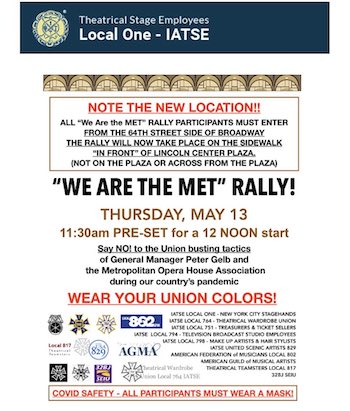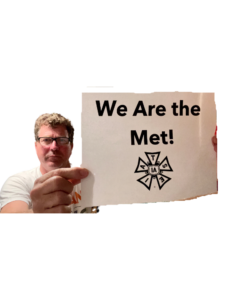Opera Commentary: Labor Action at the Met — “Wear Your Union Colors!” — Update
By Steve Provizer
Locked-Out Met Stagehands and Skilled Craftspeople, Joined by Union Supporters, Launch First-of-Its-kind Interactive “Virtual Picket Line.”

As I outline here, New York’s Metropolitan Opera House (I’ll refer to it as the Met) is the locus of a major struggle between management and labor. The Met’s unions insist that management has been using the crisis of the pandemic as an excuse to undermine organized labor. They are responding with an action called “We Are the Met Rally,” to be held at noon, Thursday, May 13 in front of Lincoln Center Plaza, Broadway at 63rd Street. Labor wants to send the message that the Met’s management needs to stop unfair treatment of its workforce and end its lockout of stagehands — or there will be no 2020-21 opera season.
With roughly 3,000 workers, the Met is the largest performing arts organization in the United States and deals with a number of different unions that represent artists, stagehands, backstage, costuming, and other arts workers affiliated with the International Alliance of Theatrical Stage Employees (IATSE), the American Federation of Musicians Local 802, the American Guild of Musical Artists (AGMA), the International Brotherhood of Teamsters Local 817, and the Service Employees International Union Local 32BJ.
Last December, Met general manager Peter Gelb announced he was locking out stage technicians and shop crew members, such as carpenters and electricians, and cutting off their wages. Stagehands, whose contract expired last July 31, were offered pay of up to $1,500 a week, but only if they agreed to a five-year contract that cuts their pay by 30 percent, leaving their salaries 15 percent below current levels — even after the Met box office completely recovers.
The New York Times and American Prospect have documented that the Met has outsourced production work to a company in Wales for two operas, Rigoletto and Don Carlos. American workers in New York would ordinarily have completed these tasks. Sets for the season premier, Fire Shut up in My Bones, have been sent to a nonunion production operation on the West Coast. The Met also has outsourced the work of musicians for online performances.
The hope is that this week’s action will generate significant media coverage and strong attendance by opera lovers and politicians. That would give unions the support they need to negotiate on a more even footing. If not, what happens at the Met could have seriously negative repercussions for unions and arts organizations across the country, as they struggle to chart an equitable path forward after the pandemic.
Addendum:
Virtual Picket Line at the MET
 Members and allies of the International Alliance of Theatrical Stage Employees, the union representing the Metropolitan Opera’s stagehands, have organized something they call a “Virtual Picket Line” —MetOperaPicketLine.com. Supporters upload photos to the site, which are then scrolled in front of an image of Lincoln Center. The action is meant to support the union’s efforts to bring the Metropolitan Opera Company to the bargaining table, seven months after the organization’s members were locked out of the MET.
Members and allies of the International Alliance of Theatrical Stage Employees, the union representing the Metropolitan Opera’s stagehands, have organized something they call a “Virtual Picket Line” —MetOperaPicketLine.com. Supporters upload photos to the site, which are then scrolled in front of an image of Lincoln Center. The action is meant to support the union’s efforts to bring the Metropolitan Opera Company to the bargaining table, seven months after the organization’s members were locked out of the MET.
There is a notice on the site reading, “The virtual picket line is for educational purposes, to publicize this matter to the general public, and to demonstrate union solidarity. It is designed to inform the general public, customers, and donors of the ongoing labor issues at the Met. IATSE is not asking anyone to withhold labor or boycott the Met, at this time.”
The site will help remind people that there are faces behind the negotiations and will give supporters an opportunity to play a more active role in the current stalemate with management. Still, as with so much on the internet, the effort functions largely in the realm of the symbolic. I assume this effort is part of the union’s ongoing calculations: how much and what kind of pressure should be put on Met administration? In any case, until some kind of direct action it undertaken, I assume that clicks on the site will be meaningful. So visit MetOperaPicketLine.com and support the effort.
Editor’s Note: This situation poses a challenge to the arts media — should the New York Times and other outlets cover the Met if it succeeds in breaking its unions? Wouldn’t that suggest compliance with its management? Nothing to see here, business as usual — as the pandemic is exploited in a strategy to undercut the salaries and benefits of cultural workers. Is it not finally time for consistency? Those who love the arts should also care about the fair treatment of those who do the work to make culture a reality. At the very least, critics, feature writers, and editors need to encourage a serious public conversation about the nature and ethics of arts coverage post-pandemic. Will the new normal be a return to — even a heightening of — economic inequities? To my mind, critics should not review companies, like the Met, that are undercutting its unions. I am anxious to hear the counter argument.
— Bill Marx
Steve Provizer writes on a range of subjects, most often the arts. He is a musician and blogs about jazz here.
